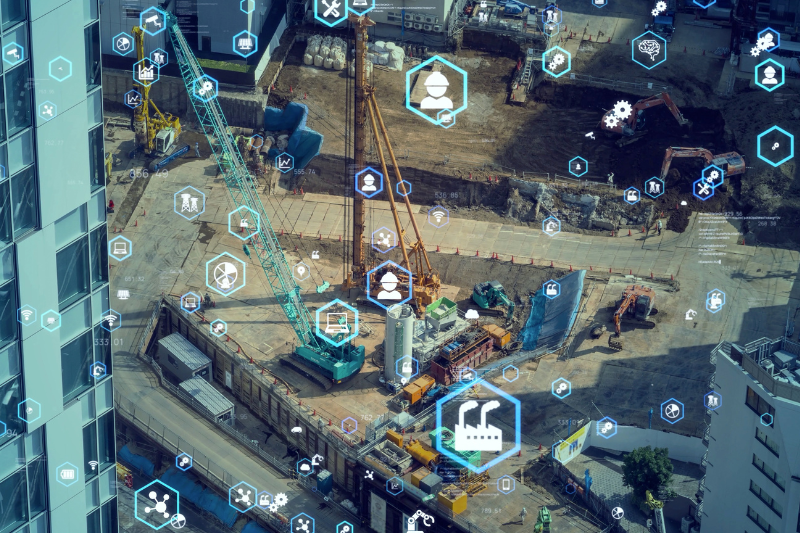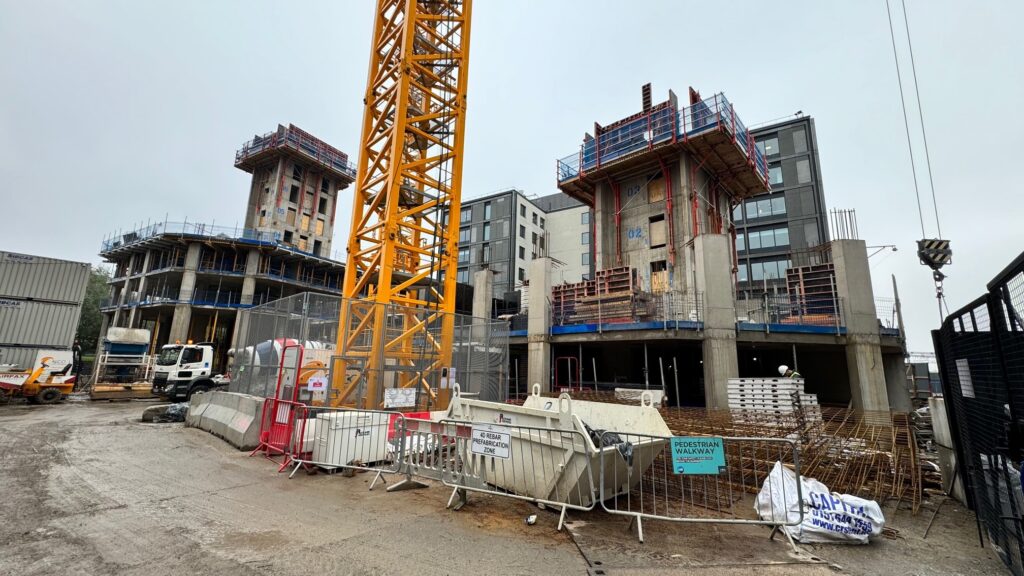The construction industry is on the cusp of major transformations in the next few years. With advances in technology, construction companies stand to benefit from new innovative technology that can improve safety and efficiency on job sites.
In this article, we will discuss six of the different types of construction technology that could change the construction industry forever in 2023.
Augmented Reality
Augmented reality (AR) is an ever-developing technology that superimposes computer-generated images on the real world, creating an enhanced view of reality.
The technology is predicted for huge growth in the construction sector, with a recent study estimating the AR Construction market to be a $150bn global industry by 2030.

Benefits of augmented reality for the construction industry
AR gives real-time visualisations of complex projects and delivers improved communication between project stakeholders.
This construction tech allows firms to present the results before they are fully built, allowing clients to better visualise their intended results while also streamlining the construction process.
Not only does it benefit the communication between contractor and customer, but it also has great benefits for construction firms internally. By allowing workers to visualise the finished product before it’s built, it provides an opportunity for greater accuracy and fewer mistakes.
Additionally, Augmented Reality can help reduce accidents by providing important information such as hazardous locations or the location of heavy equipment on construction sites.
Construction Robots
Robotics is another component that is set to progress construction technology practices in 2023. Last year saw several firms experiencing a shortage of skilled labour, and robotics could help fill certain roles that could be deemed suitable for automation.
Robotics construction technology is estimated to climb to a market of as much as $275.4bn globally by 2027.

Benefits of robotics in construction technology
Construction sites can benefit greatly from the increase in robotics use.
Automated construction equipment that robotics bring to the industry delivers increased precision and accuracy to construction projects.
And because of its sheer accuracy, construction robots can produce a high-quality output with more consistency. Therefore this would mean less waste, creating a more ‘lean’ construction project for project managers.
Though already integral in the manufacturing area, namely the modular construction process, robotics has yet to become commonplace on the construction site itself. However, this is likely to change with ever-improving technology that can benefit worker productivity.
3D Printing
3D printing, also known as additive manufacturing, is a process whereby an object can be ‘printed’ from digital images using CAD software.
Although digital technology itself has been around for many years, 3D printing is now set to become more frequently used in the construction business.
3D printing in construction technology is set to explode, with the market expected to be worth a whopping $1.5bn gloablly in 2024.

Benefits of 3D printing in construction tech
As a member of the robotics family, 3D printing brings accuracy, consistency and therefore low wastage to the construction site.
This construction technology is extremely useful in the creation of prototypes, and also for elements in construction projects that would be deemed geometrically challenging. 3D printing has now even been used to create bridges in Europe in countries such as the Netherlands (pictured above) and Italy.
Tech solutions such as 3D printing can help to reduce the amount of time needed on a construction site by cutting out certain labour-intensive processes. The knock-on effect from this is cost savings, even across more complex tasks.
And because it’s done in a factory, and then transported to the job site, 3D printing also helps eliminate potential hazards and unsafe working conditions.
Drones
Drones or UAVs (Unmanned Aerial Vehicles) are set to play an integral role in the construction technology industry, providing a way to gain data and insights into projects more accurately.
The market for drones in the construction industry is expected to be worth $10.6bn globally by 2027, over double its current market size.

How Drones benefit construction projects
Armed with the latest technology, such as 4K cameras or 3D mapping sensors, drones can undertake many tasks in the construction phase.
And not only can they perform these tasks, but they can perform more efficiently than traditional field construction methods.
This means construction companies can manage schedules, reduce costs and identify issues before they become a bigger problem.
Drones and UAVs can also improve worker safety. Site work can sometimes involve inspections or measurements being undertaken in potentially hazardous environments. Technology solutions such as drones can replace human workers in this scenario and reduce the risk of injury.
Artificial Intelligence
As with any aspect of the modern world, Artificial Intelligence (AI) is becoming increasingly important in the construction industry.
Predicted to be a $5bn global industry by 2030, Artificial Intelligence and machine learning software will be seen impacting the industry like never before.

How AI Machine Learning can benefit construction companies
Artificial intelligence can benefit many construction companies by preventing cost overruns in project management. Machine learning can help to quickly identify potential risks in project management, such as supply chain issues or labour cost inflation.
By identifying these risks before they happen, construction companies can avoid costly delays and lower the risk of project failure.
AI also has a role to play on-site, where it can be used to monitor worker safety and alert staff to any potential hazards as early as the design phase.
Furthermore, Artificial Intelligence on a building site can aid in resolving worker shortages and preserve construction productivity across a job site.
Internet of Things (IoT)
The Internet of Things (IoT) has a huge part to play in construction technology on a job site.
This cutting-edge approach can ensure projects are completed efficiently and effectively, ultimately saving time and money without sacrificing quality.
Using innovative tools such as intelligent sensors and actuators, IoT can help make a job site more holistic where some processes may be more fragmented.

How IoT can benefit the Construction Industry
The Internet of Things can help improve communication between all parties involved in a project. Conversations can occur quickly and effectively between all levels of the organisation, from on-site workers to head office.
IoT also has a role to play in worker safety. One example of this is by monitoring air quality on building sites. Intelligent sensors integrated with other construction technology software can alert workers to any potential hazards, such as a dangerous level of carbon dioxide.
Construction companies that use IoT technology on their job sites could also benefit from improved efficiencies and cost savings in the long term. Construction managers would also have access to real-time data which could be used to inform decision making and help make reduce downtime whereas a more traditional method would take longer to identify.
In conclusion, IoT technologies can combine with existing construction software solutions and form a unified platform that could potentially yield project success.
The Internet of Things is set to revolutionise the construction industry, and its arrival could not be more timely as we strive towards greater efficiency and zero downtime in our projects.
Construction Technology – Conclusion
Construction technology is ever-evolving, and reshaping the way the construction sector is able to operate.
Solutions such as 3D printing and robotics can help construction workers to deliver quicker, more efficient processes whilst reducing costs, whilst drones provide an efficient data collection tool for surveying and inspecting sites.
This year could also see the increase of use in collaboration technology such as augmented and virtual reality (AR), helping to reduce issues before they arise.
And with AI machine learning how to implement algorithms that can predict potential risks and prevent cost overruns, the latest types of construction technology are positively impacting the industry permanently.
Construction technology impacting industry can only benefit projects. Implementing construction technologies that reduce waste on-site, can only help organisations construct eco-friendly structures in a better way.
Staying up to date
As new construction technologies enable advancement like never before, the challenge for construction firms is devising strategies to create integrated solutions linking new technology with traditional construction methods.
New technology will continue to reshape how construction companies operate, from design through to completion. And as new technologies emerge construction firms need to keep up with the latest developments, to take full advantage of the available benefits.
The future is sure to be one of continued innovation as the construction industry embraces technological advancements to remain competitive and efficient.














